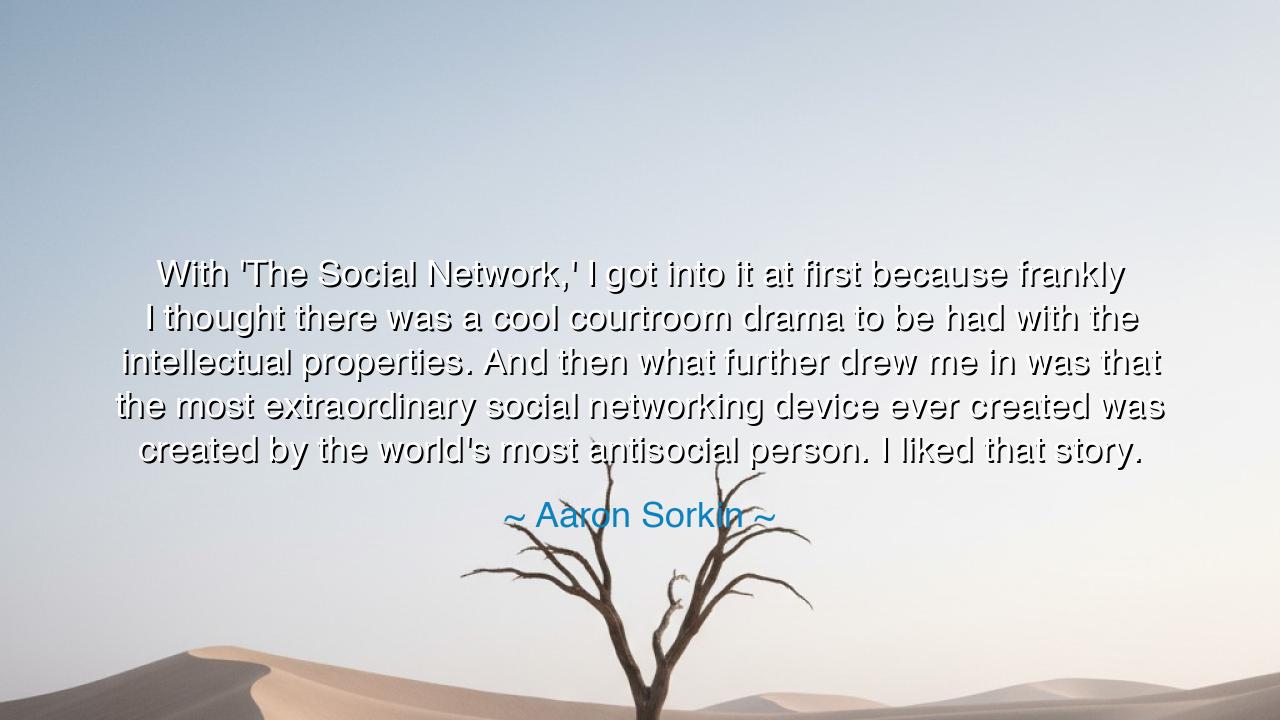
With 'The Social Network,' I got into it at first because frankly
With 'The Social Network,' I got into it at first because frankly I thought there was a cool courtroom drama to be had with the intellectual properties. And then what further drew me in was that the most extraordinary social networking device ever created was created by the world's most antisocial person. I liked that story.






“With ‘The Social Network,’ I got into it at first because frankly I thought there was a cool courtroom drama to be had with the intellectual properties. And then what further drew me in was that the most extraordinary social networking device ever created was created by the world’s most antisocial person. I liked that story.”
— Aaron Sorkin
In this revealing reflection, Aaron Sorkin, master dramatist and architect of words that strike like thunder, speaks to the heart of irony that defines our age. His fascination was not merely with technology, but with the paradox of creation—that something designed to connect the world was born from isolation, from the mind of one who struggled to connect at all. When Sorkin says that the “most extraordinary social networking device ever created” came from “the world’s most antisocial person,” he touches a truth older than silicon and code: that from loneliness often springs invention, that from imperfection emerges the engine of transformation.
The origin of this thought lies in Sorkin’s process of storytelling. When he approached The Social Network, he was first drawn by the sharp tension of intellect and legality—the battle over intellectual property, over who owns an idea, who has the right to creation. This was his surface interest, the frame of the courtroom, the drama of ambition and betrayal. But beneath that structure, he discovered something deeper—a moral paradox, a human contradiction so profound that it transformed his curiosity into obsession. For in the tale of Facebook’s birth, Sorkin found the timeless story of the lonely creator, whose desire to be seen gives birth to something far greater than himself.
This paradox is as ancient as fire. The philosopher Heraclitus once said, “Out of discord comes harmony.” So it is with the creative soul. The one who feels disconnected strives to build connection; the one who feels unseen seeks to create visibility for others. So it was with Mark Zuckerberg, the central figure of Sorkin’s tale—a man whose awkwardness and solitude gave rise to a digital empire of communication. Sorkin recognized in him not a villain nor a hero, but a modern Prometheus—stealing fire from the gods of human interaction and giving it to the masses, yet forever standing apart from the warmth he created.
Through this lens, Sorkin’s words illuminate the tragedy and wonder of invention: that progress is born of contradiction. The creator’s gift often costs him peace. The painter isolates himself to show others beauty; the scientist sacrifices comfort to uncover truth; the writer withdraws from society to understand it better. So too does the modern coder retreat into a screen to build the web that binds the world. In the heart of the antisocial, there lies a fierce yearning for connection—and that yearning, when transformed by intellect and purpose, becomes the seed of revolution.
Yet Sorkin’s insight also carries a warning. For in every age, the tools that connect us can also divide us. The social network that promised unity has birthed echoes of loneliness and comparison, a digital mirror that both reflects and distorts. The irony that drew Sorkin to his story remains alive in our time: that humanity’s greatest instruments of communication were crafted by those who struggled most to communicate. It is a reminder that technology, for all its brilliance, cannot heal the human heart unless guided by empathy. Connection without compassion is like light without warmth—it illuminates, but does not comfort.
Consider too the storyteller’s role, which Sorkin embodies. Like the ancient poets who sang of gods and mortals, he does not merely recount events—he deciphers them. He turns history into parable, invention into introspection. In Sorkin’s telling, the courtroom becomes a temple of conscience, and the antisocial inventor becomes the vessel through which we see ourselves. For who among us has not sought belonging? Who has not, in some quiet corner, built a small world to be seen and understood? This is why his story endures—it speaks to the shared wound and wonder of being human.
And so, the lesson, like the melody of an eternal song, resounds through Sorkin’s words: from solitude, create meaning. If you find yourself isolated, let that silence become your forge. If you feel misunderstood, let that longing fuel your work. Do not despise your contradictions—they are the engines of your becoming. For even the antisocial can build bridges, and even the disconnected can awaken connection in others. The power to create lies not in perfection, but in paradox. And when we, like Sorkin, learn to see the beauty in that contradiction, we begin to understand the divine irony that shapes both art and life.
So remember this, traveler of time and thought: every invention, every story, every act of creation begins with one who feels apart. Yet by daring to give shape to that feeling, they draw the world closer together. The mask of the antisocial creator hides a universal truth—that humanity, in all its loneliness, has always built its greatest works in the pursuit of belonging. Thus, as Sorkin reminds us, it is not the machine that matters, but the heart that dreamed it into being.






AAdministratorAdministrator
Welcome, honored guests. Please leave a comment, we will respond soon